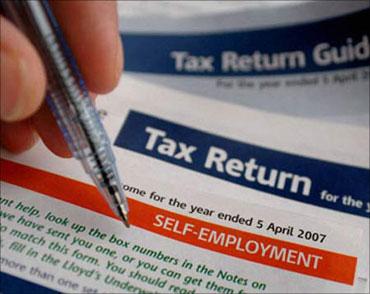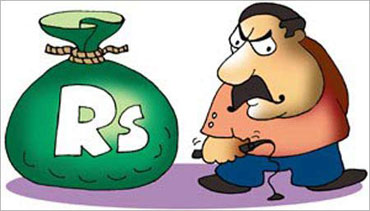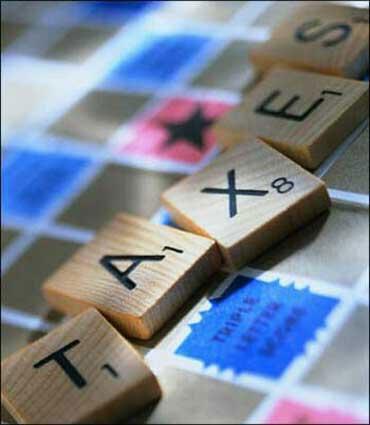
There is a perception among several individuals that having paid taxes via TDS (tax deducted at source), filing of returns is not important, because after all, the government's main objective is to ensure that its tax kitty is getting the revenue due to it.
This is a misconception and it is essential to know that it is our constitutional obligation to file tax returns when required to do so. So your job does not end at paying taxes, filing returns is equally important. This brings you to the question:
When does it become essential to file returns?
It is essential to file returns when your income crosses/exceeds the basic exemption limit even if it means that on account of you investment planning, your tax obligation may be nil. So for FY 2009-10, filing of tax returns is essential if Individuals have taxable income exceeding Rs 160,000 p.a. Women have taxable income exceeding Rs 190,000 p.a. Senior Citizens have taxable income exceeding Rs 240,000 p.a.
Tax evasion
Income tax authorities allow you to self-assess your income and accordingly pay taxes. Many people tend to believe that his/her income tax return is a drop in the ocean for the Income Tax authorities and hence not declaring income or understating income may well be worth because it saves you a few bucks.
Deliberately hiding your income from the Income Tax authorities, to reduce your tax liability, amounts to tax evasion.
How does the I-T department catch tax evaders? . . .

Some examples of tax evasion include not declaring interest received on bank fixed deposits or accepting income in cash and not routing it through the official system.
Methodology
In order to pick up cases of likely tax evasion, the tax department uses a computer-aided scrutiny system (CASS) that picks up cases by inputting various criteria.
You may just be the unlucky one and you can come under scrutiny which is inviting trouble for yourself as you will be required to furnish all details that he asks for which could include, bank account statements, list of all assets owned by you and your family, details of all family members who reside with the you, and then the Income Tax officer will do a match analysis of income and expenditure to figure out the amount of tax evasion.
The Income Tax officer can serve the scrutiny notice within one year from the end of the month in which you have filed your return. So, if you had filed your return of income for the FY ended March 31, 2008, on July 24, 2008, you may get a notice any time on or before July 31, 2009.
The notice will be in a fixed format with your name, address, PAN and the year in which it is issued and time and date when the taxpayer should appear before the Income Tax officer.
The taxpayer need not appear personally before the officer. He can authorise a representative to plead his case.
What is the impact of tax evasion? . . .

Impact of tax evasion
Any individual found concealing income will be charged a penalty and that amount can be anywhere up to 3 times the amount of tax evaded.
So if your tax evasion amount is Rs 50,000 and your account is under scrutiny, you may have to pay a penalty of anywhere between Rs 50,000 and Rs. 150,000 on a case to case basis.
Coming under the taxman's scanner is certainly not a pleasant experience as it can be emotionally and mentally draining.
Hence, it makes sense to comply with the Income Tax regulations and file your returns correctly. In trying to save yourself a few bucks, you don't want to be in a situation where you have the taxmen chasing you, giving you sleepless nights.
Filing returns has advantages and hence it may make sense to file returns even if you're not needed to because it is an important document that has a lot of weightage.
| Particulars | Pros | Cons |
| Fulfilling proof requirements | Income tax papers are an important document that comes in very handy when you are applying for a loan or an insurance policy or even when you're applying for a visa to travel abroad. It is a proof of your income and other important details such as PAN card, address among other things are mentioned. This will ensure quick processing thus reducing hassles. | Not having the Income tax return proof can result in difficulty especially when it is a pre- requisite for may be a loan or an insurance policy or for completion of visa formalities. |
| Tax refunds | On the basis of the tax return filed, refund is paid at an interest of 8% p.a. with retrospective effect from April 1 of the year. | If you have not filed your return, but TDS has been deducted in excess by your company, unless you file your income tax return, you will not get a refund and hence you may end up losing money. |
| Income Official scanner | Filing accurate returns saves you from the hassles of getting caught by the income tax officials | If you come under the tax official's scanner, then you may end up having to pay tax with interest on the tax amount payable and penalty too. Besides, you will also be stressed as you need to fulfill all the needs of the income tax authorities in terms of documentation. |
What documents do you need while filing returns? . . .

Documents to be kept handy for filing returns
In order to calculate your tax liability and file accurate returns, it is essential that you keep all the documents, from which data is required, handy.
The documents required include:
Form 16: This document contains information on your salary and tax deducted by your employer. You need to obtain it from your employer
Form 16 A: This you need to obtain from the parties who have deducted tax while making payments to you during the year. This includes banks/ companies with whom you have a fixed deposit, parties to whom you have given loan among others.
Copy of bank statements: This will give an idea of all the income earned and expenditure incurred. This will ensure that you have not missed out on any details which should be part of your Income Tax return.
Proof for all the deductions claimed in the return filed, i.e. PPF, NSC, mutual funds, insurance, among others.
Documents concerning investment in property: If you have bought any property during the year, you will need details. In case the property has been purchased on loan, all the loan documents, along with a copy of the certificate of the payments made, is needed.
Documents on purchase and sale of investments/assets: Keep a track of all your investments in shares, debentures or any other instrument. Record the purchase date and sale date so that you can assess the profit/loss for the purpose of filing returns.
The taxpayer is not required to submit any documents at the time of filing returns.
However, it is essential that all the above mentioned documents/information should be preserved at least for a couple of years as they may be useful to substantiate the return filed if it is picked up for scrutiny.
What about tax refunds? . . .

All about tax refunds
Declaration of proposed investments is an activity that organisations ask their employees to do at the beginning of the financial year.
Individuals tend to treat this exercise with little thought, not realizing its impact. So often, the employer ends up deducting more TDS (tax deducted at source) than needed.
This will come to light at the time of filing your returns, warranting a tax refund.
What is a tax refund?
A tax refund is a claim by taxpayers from the Income Tax authorities, for paying taxes in excess.
When can you claim the refund?
Tax refund can be claimed within one year of the last day of the assessment year. For the Assessment Year 2010-11, tax refunds can be claimed before March 21, 2012.
How should you claim refund?
The taxpayer can claim refund at the time of filing returns. If for some reason you were not able to file for refund at the time of filing the refund, you can file a revised return of income stating the amount of refund within the specified time frame.
How do I receive my refund? . . .

How will you receive the refund?
The refund can either come in the form of a cheque directly to the address furnished by you while filing your tax returns, or -- if details are provided pertaining to the bank account such as bank name, account number and MICR code -- the tax refund can also be directly credited to your account.
Within what time frame should you receive tax refunds and when?
Tax refunds should actually come within a year of filing returns. However, the average time taken is around two years from the date of filing returns which is a marked improvement from the earlier time frame of three years plus.
Tax refunds tend to dry up during January to March, as Income Tax authorities need to meet their tax collection targets, so post this period is when the refunds are usually received.
What should you do if you don't get your refund for over a year? . . .

What should I do if I have not received my tax refund for over a year?
The Income Tax authority has come up with an online facility for tracking the status of your tax refund. This is currently available in six cities and is being extended nationwide, in a phased manner.
You need to log on to the NSDL website, enter your PAN and the year for which you need to get a refund to figure out your status.
Those who do not have this access yet need to follow the steps outlined below.
Write a letter to the concerned Income Tax assessing officer providing details such as the amount of refund, PAN, the AY for which the refund has not been received, the date of filing returns and the acknowledgement number that you would have received while filing returns.
Make sure you receive an acknowledgement for the letter.
In case you do not receive a response for a month, you may write to the jurisdictional Chief Commissioner of the Income Tax with a copy to the assessing Income Tax Officer pointing out that you have not received refunds and have not received any correspondence on the subject in spite of a reminder.
Enclose the copies of your earlier communication. Make sure you get an acknowledgement for the letter.
If you do not receive a response after a month of sending the above letter, you then need to take up the matter with the Income Tax ombudsman. You need to send a letter to the ombudsman giving details of the refund due to you, and enclose your correspondence with the Income Tax authorities.
In most cases, you should receive your refund without any hassle because the ombudsman is very powerful and any communication from here is binding on the Income Tax authorities. Only in complicated cases, both, the taxpayer and the assessing officer will be called for a meeting.
The taxpayer can also file an application under Right To Information Act, 2005, to find out the status and to track his tax refund.
In order to avoid finding yourself in a situation where you need to file for a tax refund, make sure you provide appropriate information to your employer in time so that he does not deduct taxes in excess of what is required.